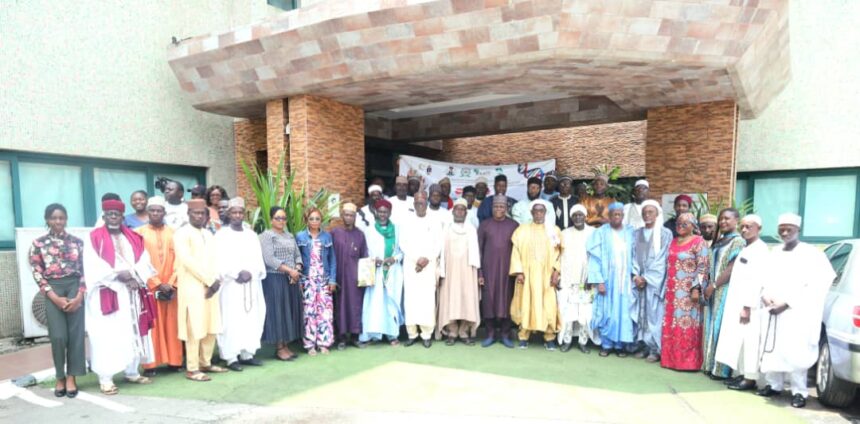By Onche Odeh
Agricultural scientists have joined government agencies responsible for biotechnology research and regulation in Nigeria to address growing biosafety concerns about genetically modified organisms (GMOs) raised by Nigerians through religious communities .
GMOs were introduced in Nigeria to improve food security, increase crop yields, and combat pests and diseases. The National Biosafety Management Agency (NBMA), working alongside scientific institutions like the Institute of Agricultural Research (IAR), has approved several genetically modified crops for commercial use, including Pod Borer Resistant (PBR) Cowpea, Bt cotton, and pest-resistant TELA maize.
Despite increasing demand for these improved crop varieties, religious groups in Nigeria—a nation with significant Muslim and Christian populations—have expressed concerns rooted in faith-based ethical and safety considerations. Questions raised include whether GMO foods comply with halal dietary laws, potential health risks, environmental impacts, and the moral implications of altering what some believe to be God’s natural creation.
Muslim communities, for instance, seek assurance that no genetic material from non-halal sources is used in GMO crops. Meanwhile, Christian groups emphasize the importance of transparency, informed consent, and respect for natural processes, reflecting their ethical concerns about biotechnology.
Recognizing these perspectives, government agencies and scientists engaged religious leaders to foster dialogue, clarify misconceptions, and build trust in workshop held in Abuja on Tuesday to sensitize the Islamic community on how to draw the lines between science and religion on issue that relate to genetic modification.
In a presentation that assures on the regulation and safety of GM products in Nigeria, Dr. Agnes ‘Yemisi Asagbra, Director-General and CEO of the National Biosafety Management Agency (NBMA), said, “The NBMA is well positioned to provide a holistic regulatory framework for genetically modified organisms,” she said. Dr. Asagbra explained that biosafety is rigorously evaluated at every stage of development, with the entire approval process typically spanning 10 to 13 years.
Dr. Asagabara, who was represented by Josephine Adeogun, Head, Genetic Modification Detection and Analysis Laboratory, NBMA highlighted the key safety considerations involved before commercialization, including the characteristics of the GMO itself, the donor and recipient organisms, vectors used, and genetic insert locations. “We also carefully assess the history of safe use, potential toxicity and allergenicity, nutritional equivalence, and other factors critical to human health,” she noted.
Echoing this commitment to safety, Professor Abdullahi Mustapha, Director-General of the National Biotechnology Research and Development Agency (NBRDA), expressed his enthusiasm about the workshop’s ability to bridge science and faith, two aspects that have dominated past debates on GMOs.
“This event demonstrates that science is fundamentally people – centric. It provides a vital opportunity for the scientific community to receive valuable feedback on genetically modified products, including those developed here in Nigeria,” he said.
Prof. Mustapha underscored the important role religious leaders play in shaping community perspectives.
“Your voices carry moral authority and wisdom, which are essential to this conversation. Your engagement today will bring clarity, confidence, and context to discussions about GMOs,” he told participants.
Recognizing the ethical framework of Islamic teachings, he said, “Islam requires that what we consume be both halal and tayyib — wholesome, pure, and free from harm. It is our shared responsibility to ensure that any agricultural biotechnology products we adopt fully align with these higher objectives of Sharīʿah, protecting life, health, and dignity.”
Prof. Mustapha described the workshop as a meeting point of two pillars of Nigerian society: faith and science, stating also that, “By bringing everyone together, we reaffirm the belief that modern biotechnological innovations grounded in rigorous research and guided by shared ethical values can become powerful tools for social welfare.”
He said countries like Nigeria where millions face food insecurity and climate challenges cannot afford to dismiss any safe and effective technology that can help secure the wellbeing of families.
The workshop brought together experts like Professor Mohammad Ishiyaku, Principal Investigator of the PBR Cowpea Project, who explained the scientific basis of GMOs and how modern biotechnology offers sustainable solutions to agricultural challenges such as climate change, pests, and diseases.
In a lucid presentation broken down to the Islamic cleric, Prof Ishiyaku, a devote Muslim, underscored the limitations of conventional methods like pesticides and hybridization, advocating for genetic enhancement as a safer, more economical alternative.
Quoting from the Holy Quran, Prof. Ishiyaku connected the ideals of the faith and science, encouraging acceptance of biotechnology within the framework of religious teachings that promote moderation, purity, and the protection of life.
Dr. Benard Ehirim, Stewardship Program Officer with African Agricultural Technology Foundation (AATF) emphasized that genetic modification as deployed in Nigeria has been with recur to responsible stewardship.
“For GM crops to make a real impact, they must also gain the trust and acceptance of consumers and that requires clear communication, transparency, and effective marketing strategies,” he said, highlighting the reason behind the broadened engagement with sections of the community.
He said AATF, as a strong partner in the adoption of modern agricultural biotechnology in Nigeria and other parts of Africa commits to the deployment of responsible Stewardship through trainings, monitoring, audit, public engagements and following regulatory requirements strictly.
He said, “this is the way to go in this discuss and the way to help provide credible information to the public.”
Experts at the meeting stressed that genetically engineered crops, example TELA Maize are safe because of the rigorous biosafety regulatory approval process involved.
“Strategic combination of Conventional Breeding and Transgenic Technology has resulted in 53 TELA®, Climate-smart hybrids, with four released in Nigeria; potential to transform maize production amid climate change
Key facts presented at the meeting include the long history of safe use of Bt proteins since the 1950s, the absence of toxicity or allergenicity concerns with Bt maize and drought-tolerant varieties, and environmental safety demonstrated through international protocols and scientific studies.
With Nigeria facing persistent food insecurity and climate pressures, the collaboration between faith leaders and scientists marks a critical step toward building public confidence and ensuring that biotechnology innovations contribute effectively to the country’s agricultural development and food security.





